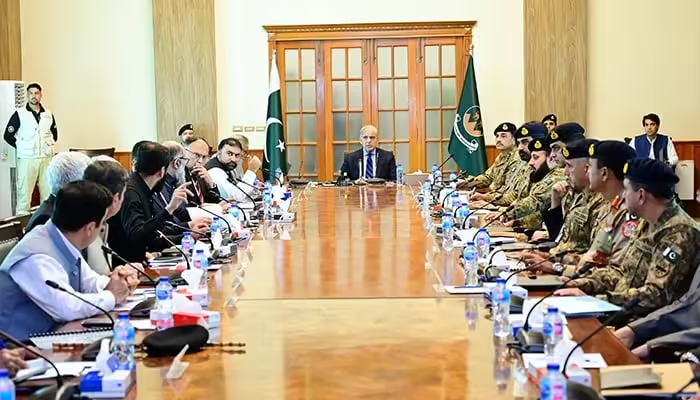In response to a series of devastating terrorist attacks in Balochistan that claimed over 50 lives, Prime Minister Shehbaz Sharif visited the provincial capital, Quetta, on Thursday and pledged to eradicate terrorism from the region at all costs. During his visit, he emphasized that the “blood of martyrs will not go in vain” and vowed a decisive stance against terrorism.
The Prime Minister’s visit coincided with a high-level meeting of the National Action Plan’s provincial apex committee. Attendees included Chief of Army Staff General Asim Munir, Deputy Prime Minister Ishaq Dar, Balochistan Governor Sheikh Jaffar Khan Mandokhail, Chief Minister Mir Sarfraz Bugti, and various federal and provincial officials. The meeting aimed to address the recent surge in violence and strategize on counter-terrorism efforts.
The backdrop of the visit was the recent spate of attacks across Balochistan, Pakistan’s largest province by land. Over the past days, the region has witnessed a series of brutal assaults that have left 50 people dead, including 14 security personnel. Among the most tragic incidents was an attack on Monday in Musakhel, where 23 passengers were killed after being forcibly removed from their vehicles. In a separate attack in Kalat, 10 individuals, including police and Balochistan Levies personnel, were martyred. Additionally, 14 security forces and law enforcement personnel were killed in clearance operations aimed at neutralizing militants, with at least 21 militants reportedly being killed.
In the wake of this violence, both federal and provincial governments have strongly condemned the attacks. Prime Minister Shehbaz Sharif, in his address, ruled out dialogue and any “soft approach” towards the perpetrators, labeling the attacks as “tragic and barbaric.” He described the attackers as “Khawarij” and vowed to crush these groups through collective national efforts and the valor of Pakistan’s forces.
Prime Minister Sharif reaffirmed the importance of Balochistan to Pakistan, pledging to remove all obstacles to its development and prosperity. He acknowledged that terrorism has resurged since 2018 but reiterated the government’s commitment to defeating those responsible for the recent bloodshed. Expressing confidence in the capabilities of the armed and civilian forces under General Asim Munir’s leadership, Sharif assured that the sacrifices of the fallen will not be in vain.
The Prime Minister highlighted that enemies of Pakistan aim to obstruct the development of Balochistan and the China-Pakistan Economic Corridor (CPEC), but he assured that these efforts will not succeed. He stressed the need for a unified approach to eliminate terrorism from the province and firmly ruled out any negotiations with terrorists. However, he indicated that talks could be considered with those who respect Pakistan’s Constitution and flag.
In a move to strengthen security and administrative capabilities in Balochistan, PM Sharif announced a policy for deploying competent officers to the province. A total of 48 officers from the Common Training Programme will be deployed, with half arriving immediately and the rest within six months. To incentivize these officers, the government will provide air tickets for their families every three months and additional points for performance-based evaluations.
The recent escalation of militant attacks in Balochistan comes amid a broader increase in violence across Pakistan, particularly since the Taliban’s return to power in Afghanistan in 2021. While Khyber Pakhtunkhwa has been a primary focus of militant activity, Balochistan has also experienced significant violence, largely attributed to militants crossing from neighboring Afghanistan and Iran.
According to the Pakistan Institute for Conflict and Security Studies, there were at least 170 militant attacks in Balochistan last year, resulting in 151 civilian deaths and 114 security personnel fatalities. Islamabad has accused the Taliban government of failing to address the issue of militants finding refuge on Afghan soil, further exacerbating the security situation in Pakistan.
As the situation continues to develop, Prime Minister Shehbaz Sharif’s visit underscores the government’s determination to tackle terrorism with resolve and to restore peace and stability to Balochistan. The actions and policies implemented in response to these attacks will be closely watched as the region seeks to overcome this period of intense violence and insecurity.



